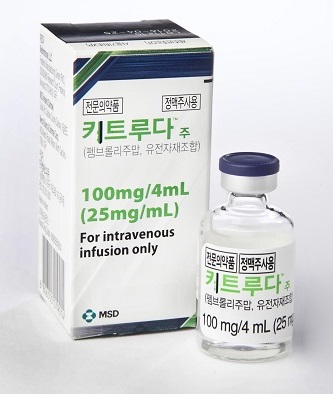MSD Korea has applied to consider expanding insurance coverage criteria for 13 indications of its anti-PD-1 immunotherapy Keytruda (pembrolizumab), including endometrial and cervical cancer.

The 13 indications are early-stage triple-negative breast cancer; metastatic or recurrent triple-negative breast cancer; metastatic or recurrent head and neck cancer; advanced or metastatic esophageal cancer; adjuvant therapy after surgery for renal cell carcinoma; non-muscle-invasive bladder cancer; and persistence, recurrent or metastatic cervical cancer; advanced endometrial cancer; MSI-H or dMMR metastatic endometrial cancer; inoperable or metastatic colorectal cancer with MSI-H or dMMR; MSI-H or dMMR metastatic small bowel cancer; MSI-H or dMMR metastatic ovarian cancer; and MSI-H or dMMR metastatic pancreatic cancer.
Since its development, Keytruda has demonstrated efficacy in various cancers, making it the immunotherapy with the most indications worldwide. In Korea, however, its approval and reimbursement have been centered on high-prevalence tumors, such as lung and breast cancer.
Keytruda has 38 indications in 18 cancers, according to the U.S. Food and Drug Administration (FDA). However, the Korean regulator has approved only 24 indications in 16 cancers, including lung, esophageal, head and neck, Hodgkin's lymphoma, urothelial carcinoma, endometrial, and triple-negative breast cancer.
The reimbursement criteria are even more restrictive. Keytruda gets coverage for seven indications in four cancers here.
Some clinicians raise the need to improve access to Keytruda in cancers where immunotherapy has recently emerged as a new standard treatment, including endometrial and cervical cancer.
"To meet the needs of Korean cancer patients, their families, and healthcare providers, we have applied for coverage expansion for indications with high clinical need and reimbursement for new therapies," a company official said. "The move aims to increase access to treatment for all patients who need the benefits of Keytruda, and we look forward to the day when all patients with these cancers will have the opportunity to be treated with Keytruda."

